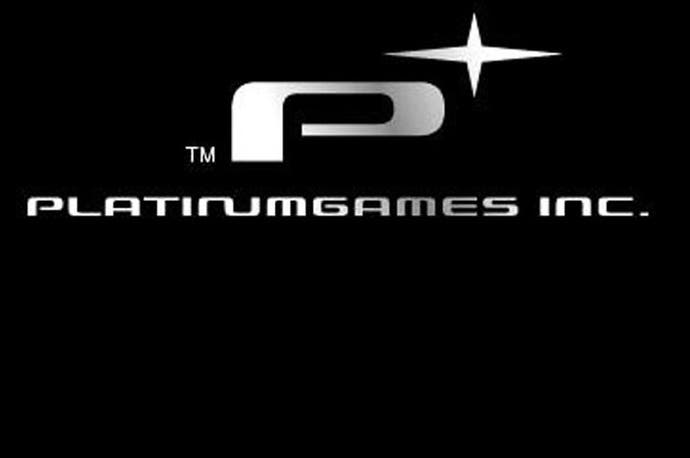A brief history of one of gaming's greatest studios
Infinite climax action: Rich Stanton celebrates Platinum Games on its 10th anniversary.
Five years ago I asked Atsushi Inaba, one of Platinum Games' co-founders, about the dire prognostications many in the west made about the state of the Japanese industry. "I don't like it when people lump Japanese developers all together into one group," Inaba answered. "Frankly I think it's a joke. What do these people know? [...] There are tons of terrible western developers, just like there's tons of terrible Japanese developers. To lump studios together in great masses misses the point."
Inaba's point may be wider, but he was also flagging up that Platinum Games is not your ordinary game development studio - regardless of where it's located. All true, and yet the doomsayers were in a certain sense correct. The Japanese industry then and now is undergoing constant change, and in recent years has moved even further towards mobile and away from the kind of big-budget console experiences Platinum Games specialise in.
All of this may explain why, in recent years, Platinum Games has positioned itself as a standard-bearer for the Japanese industry, adopting the slogan: "Taking on the World as the Representative of Japan." President and CEO Tatsuya Minami unpacked this, in a post to celebrate 10 years of Platinum Games. "Japan used to lead the worldwide video game industry, but we can't help but feel that it has lost some of its vitality in recent years. Yet we are using this state of affairs to motivate and inspire ourselves [...] We will keep up our fighting stance."
What else could it do? Platinum Games is a specialist studio, and that speciality is action games and even more specifically third-person fighting games - of the ten games released in its first ten years, only JRPG Infinite Space and the spectacular shooter Vanquish don't fit in this category. To understand why, you have to know where it came from.
Platinum Games was initially formed by former employees of Capcom and, in particular, those who had worked at the short-lived Clover Studios. Clover was an internal Capcom studio formed under the ideal of bringing together top creative talent to make original titles, and was initially composed of members of Team Viewtiful - the developers that had worked under Hideki Kamiya to create 2003's Viewtiful Joe. Clover began by making the sequel to Viewtiful Joe and working on some spin-offs while cooking up the real masterpieces: 2006 saw both Okami, perhaps the most beautiful game ever made, and the peerless God Hand, an original and brilliant take on the brawler genre.
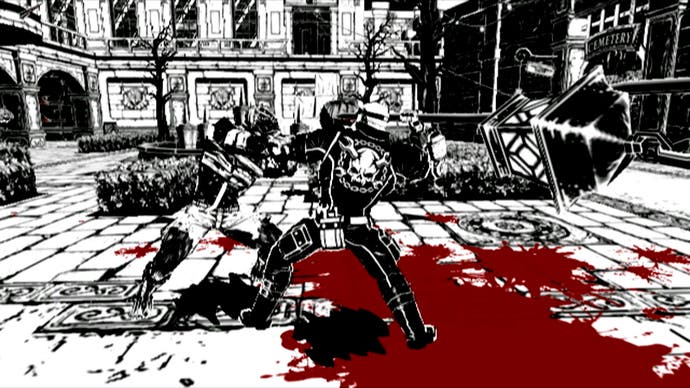
Neither sold well, and so Capcom intended to re-absorb Clover Studios. Instead Atsushi Inaba, Hideki Kamiya, and Shinji Mikami formed their own company - SEEDS Inc. - which soon thereafter would merge with Tatsuya Minami's ODD Ltd. to form PlatinumGames. Minami was a Capcom producer who, while not at Clover, found himself in increasing sympathy with the team's position. And the messy timeline of all this leads to an interesting point: PlatinumGames' 10th anniversary should technically be October 2017.
Instead, the tenth anniversary PlatinumGames is celebrating is Tatsuya Minami's founding of ODD Inc. in February 2006, rather than the merger of ODD and SEEDS in October 2007. Here's an interesting three months: SEEDS Inc. is founded in August 2006, God Hand is released in September 2006, and Capcom's board votes to close Clover Studio in October 2006.
All of this is to say that it's pretty interesting PG considers its own origin to be in February 2006, which is before either Okami or God Hand are released and before most of its top talent had even left Capcom. It suggests Platinum's main players had long-planned their departure from a company they considered sequel-obsessed and resistant to backing new IP - not that this stopped their final two productions for Capcom being absolute masterworks.
One of the things that is perhaps not immediately obvious about PG is how pugnacious the studio's main personalities are, even if this sometimes comes - with Minami himself - in the form of politeness and wry humour. So it is that PG signed up their first four titles (and eventually a fifth) with Sega, a Capcom competitor, established their office in Osaka (where Capcom is based) and immediately set to work in genres that Capcom specialised in.
Platinum Game's first title was Madworld, released for Wii in 2009, and perhaps we caught a glimpse of it in God Hand. The bombastic end credits of that game featured a graphical filter for a few seconds showing Gene and Devil Hand fighting in black-and-white. The producer on both games was Atushi Inaba but, where God Hand was a game for hardcore beat-em-up fans, Madworld focused on a more accessible system and an outlandish, Sin City-inspired, visual style.
At the time the choice of platform seemed perfect, not least because Wii lacked comparable titles and the aesthetic style overrode the machine's relative lack of power. For its debut Platinum Games - and this would later be the case with Wii U - squeezed more out of Nintendo's hardware than anyone outside of Kyoto. I found Madworld's core fighting system fun if slightly lacking in depth, but what's striking in hindsight is seeing Platinum Games establish the production values that would go on to define the studio: distinctive visual styles and top-class technical execution, alongside a soundtrack featuring both in-house composers and outside artists.
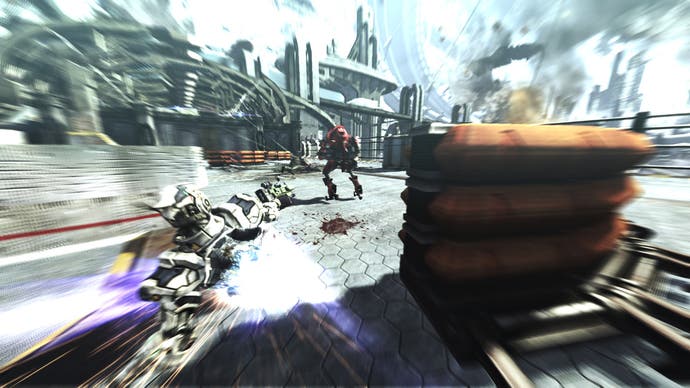
The DS RPG Infinite Space, released a few months later in June 2009 (it would take just under a year to be localised), is an oddity in Platinum Game's back catalogue - it was a collaboration with the intriguingly-named Nude Maker, but perhaps more to the point it was a resumption of the partnership that had brought the world Steel Battalion. Director Hifumi Kono's unique mech-battler, which came with a bespoke 40-button controller, had been shepherded through a nervous Capcom by producers Atsushi Inaba and Shinji Mikami.
Whereas Steel Battalion was remarkable for bringing a mech cockpit into your living room, Kono's vision for a space RPG was all about creating a gigantic universe on a cartridge the size of a stamp. Infinite Space is a stunning RPG, with an original battle system and a galaxy that just never seems to end - but it's also a tough world, where mistakes are brutally punished, and only the most committed pilots ever get over that hump and see the beauty. To this day no-one, least of all Platinum Games, has made something quite like it.
Platinum Games' first undisputed classic came at the end of 2009, and was the firebrand director Hideki Kamiya's Bayonetta - a game he claimed would reinvent the genre his team had created with Devil May Cry. These developers were known as Team Little Devils, and so the Bayonetta team were credited as Team Little Angels. It's the kind of chutzpah that could backfire, if you didn't produce a game like this.
Bayonetta is the subject of perhaps the most exhaustive and interesting 'making of' around, a 69-part developer commentary hosted on the PG website that goes into incredible detail. It's both a fascinating record and an indication of how much PG invested in this game's production, which was the first HD title the studio had worked on.
Bayonetta is arguably still the pinnacle of third-person fighting games. Its great innovation is the fluidity of combat, created through a hundred small mechanics, and the sheer impact of its protagonist in action. The ability to keep combos going after dodging, the uncountable number of ways that move-strings can be interrupted or fork out, and Bayonetta's heaven-shattering angel-smashing hair - which can finish flurries with a giant fist or summon hellspawn to munch down on bosses in button-mashing 'Climaxes' (another God Hand echo.) It is a breathtaking brawler, and yet to be bettered.
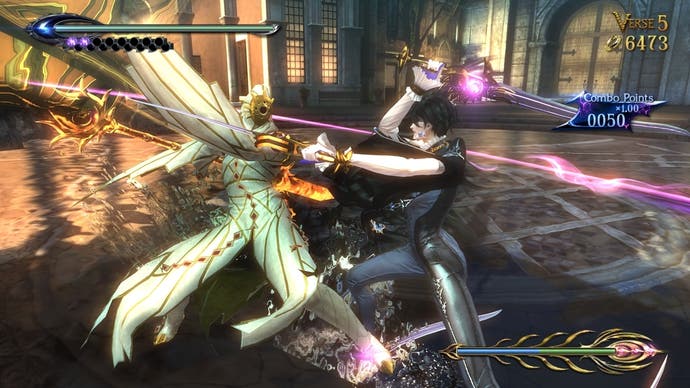
How do you follow a genre-topping title like that? By making the best game in another genre of course, in this case the third-person shooter, with Shinji Mikami's Vanquish. Resident Evil 4, also directed by Mikami, had been a huge influence on third-person shooters, but Gears of War in particular had replaced the tank controls with more fluid movement and cover mechanics. Epic's game, however, suffered from a stop-and-shoot type of rhythm - you'd start an encounter, pick off as many enemies as possible from your spot, then shift. Vanquish was a correction.
Vanquish basically makes players into a glass cannon - the power-suited Sam Gideon is incredibly fast and has all the offensive power he'll ever need, including slow-mo, but he can't take too many hits. The robotic enemies swarm into the locations and move for him, on the higher difficulty levels in particular making a beeline for the flanking spots. So your main offensive tool is movement: this is a 'cover' shooter about catching a breather then blasting off in another direction, rather than lining up behind a trash can to hold off an army.
Vanquish is another Platinum Games title that still stands alone: think about how many third-person shooters we see, and six years after release not a one can touch it. It's criminal that this hasn't yet seen a current-gen release or the PC version it so richly deserves. After completing the game Shinji Mikami, meanwhile, became the first founding member to leave Platinum Games, in order to establish his own studio Tango Gameworks.
"Mr Mikami always wanted to be his own man, and his own developer," Tatsuya Minami says. "As one of the founding members of Production Studio 4 and Clover Studios, he felt a certain responsibility to all of the creators he had worked with up until that point. When Clover disbanded and Platinum Games began, he made a commitment to those people to make a game with them, one of the first Platinum Games titles. We were always talking about what would come next. He wanted to make his things in the environment of his choice, and create his own company. We were always talking about that, and once Vanquish was finished that's what he went off and did. We're incredibly respectful of Mr Mikami, and admire his work very much."
The quality of Platinum Games' output convinced Sega it was on to a good thing, and so a deal for a fifth game was agreed - 2012's Max Anarchy, a semi-sequel to Madworld that focused on huge cast of player-characters and multiplayer. In a genre that doesn't necessarily suit multiplayer too well, Max Anarchy managed to come up with great game types and environments, even if the netcode was below-par. This was the least of the game's problems however: by the time of release Sega, fearing another commercial flop, decided that promoting Max Anarchy would be a waste of money. The games' good ideas have gone largely unnoticed.
No wonder, perhaps, that this was the last game Platinum Games would create for Sega - it was a partnership that sustained the studio in its early years, but after poor sales and Max Anarchy's treatment (as well as a poor PS3 Bayonetta port) each side was probably glad to cut ties. This marked a shift for Platinum Games and over the coming years, as well as big exclusives underwritten by platform-holders, it began doing licensed work.
The first example of this speaks for itself: Metal Gear Rising: Revengeance. Even though Platinum Games had been formed to work on original IP, the lure of a global series like Metal Gear was enormous - as was the fact that, with the project in trouble, Hideo Kojima had decided only they could save it. Platinum Games took what was by all accounts an over-complex design, built around the game's 'cutting' technology, and focused on delivering a top-tier beat-em-up that incorporated the cutting at critical moments.
Raiden, MGS2's milksop and MGS4's cutscene fantasy, is reborn as the definitive cyborg ninja, ruthlessly stylish and with a savagery that left the original character far behind. Metal Gear Rising: Revengeance turned out a thing of rare beauty, marrying lightning-fast core combat to an OTT military-industrial dystopia, where senators pumped with nanomachines fight for the world's future against a backdrop of exceptional hair metal.
Kojima wasn't the only big cheese to have noticed Platinum Games' abilities. The studio signed up with Nintendo to produce two exclusive games for Wii U - The Wonderful 101 and Bayonetta 2. The Wonderful 101 was Hideki Kamiya's next game as director, and it's such an unusual spin on the third-person action game that it initially confounds. You control a group of tiny heroes, collecting more along the way, and can 'unite' them into shapes using the gamepad or the right analogue stick - a sword, a fist, a hammer, and so on. Alongside this mechanic, which gives you access to every weapon the group has in an instant, you have utility attacks, dodges, blocks and counters.
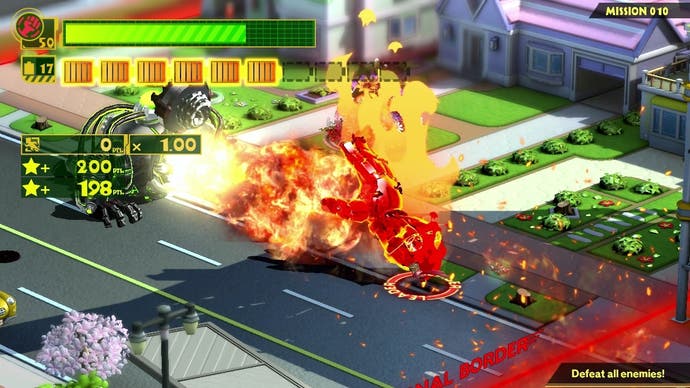
But it's The Wonderful 101's setting and style that make it unique, a futuristic suburbia of superheroes and evil alien doppelgängers, where your perspective is much further back than usual, giving the world a Pikmin-esque quality. It's a game overflowing with set piece imagination, which in the finale acquires galactic proportions, and as you scale the difficulty levels morphing between weapons becomes both second nature and reveals its own intricacies.
If 2014's Bayonetta 2 was more straightforward, that's the only unremarkable thing about it. First-time director Yusuke Hashimoto, faced with making a sequel to a game with a near-perfect combat system, decided to focus on letting it shine - to an extent greater than even the original - and building Bayonetta 2 for replayability. This is a peach and, as Martin said in our review, "Bayonetta 2's biggest disappointment may be that it's an iterative sequel, but it's not such a problem when it's iterating on genius."
Platinum Games has recently turned to licensed titles for Activision, with Legend of Korra and Transformers its two most recent games. Both represent the biggest shift from the studio's founding principle of creating new IP, but it's easy to see why this arrangement makes sense - many of the studio's new IPs haven't sold well, licensed games have a terrible reputation, and Platinum makes great games in its sleep. The announcement of a TMNT game in similar vein, due for release later this year, suggests the relationship with Activision may be an important part of the studio's future.
The three other upcoming projects (we know of) are Star Fox Zero, which was recently delayed until April this year, Square Enix's Nier: Automata, and the Xbox One exclusive Scalebound. It's an intriguing slate for a company that, over the past ten years, has built its reputation almost entirely on third-person combat - Platinum Games has an uncommonly strong JRPG lineage, in Infinite Space and Okami, but this perhaps indicates a re-focusing on what players want.
One constant over the studio's history is that - with a few exceptions - the games haven't sold nearly as well as their quality suggests they deserve to. In some cases, as with the Wii U games, this doesn't matter because the cost of development is ultimately underwritten by the platform-holder. Even so it's a sad fact that many players who would love Platinum Games' work have never tried it, and the studio's future as independent depends on finding those players - throw all the shade at Capcom you want, but it knows how to shift copies.
This is a wider issue, of course, and Platinum Games has also suffered terrible luck in the past with platforms and publishers. What really matters is that, after ten years, Platinum Games is still fighting - responsible for some of the finest games ever made, still independent, and successfully nurturing the young creators who can one day replace the superstars. This latter quality, in particular, may prove to be Platinum Games' lasting legacy to the Japanese games industry.
Here's to another ten years of beautiful games. The greatest tribute I can pay to Platinum's work is that, outside of all this commercial and industry stuff, when I see their logo it creates a sense of expectation. That feeling you're in for something great. There's a slogan printed just inside the front door of the developer's HQ, and when I'm playing their games it often pops into my head: Platinum never loses its lustre.
